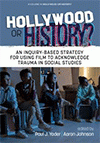
Hollywood or History?
An Inquiry-Based Strategy for Using Film to Acknowledge Trauma in Social Studies
Edited by:
Paul J. Yoder, Eastern Mennonite University
Aaron P. Johnson, University of Nebraska - Lincoln
A volume in the series: Hollywood or History. Editor(s): Scott L. Roberts, Central Michigan University. Charles J. Elfer, Clayton State University.
Published 2022
Traumagenic events—episodes that have caused or are likely to cause trauma—color the experiences of K-12 students and the social studies curriculum they encounter in U.S. schools. At the same time that the global COVID-19 pandemic has heightened educators’ awareness of collective trauma, the racial reckoning of 2020 has drawn important attention to historical and transgenerational trauma. At a time when social studies educators can simply no longer ignore “difficult” knowledge, instruction that acknowledges trauma in social studies classrooms is essential.
Through employing relational pedagogies and foregrounding voices that are too often silenced, the lessons in Hollywood or History? An Inquiry-Based Strategy for Using Film to Acknowledge Trauma in Social Studies engage students in examining the role of traumatic or traumagenic events in social studies curriculum. The 20 Hollywood or History? lessons are organized by themes such as political trauma and war and genocide. Each lesson presents film clips, instructional strategies, and primary and secondary sources targeted to the identified K-12 grade levels. As a collection, they provide ready-to-teach resources that are perfect for teachers who are committed to acknowledging trauma in their social studies instruction.
CONTENTS
Introduction to Hollywood or History? An Inquiry-Based Strategy for Using Film to Acknowledge Trauma in Social Studies. SECTION I: POLITICAL TRAUMA. Voting Rights: Selma to Today, Alicen Brown and Michael Gurlea. Us: Viewing Jordan Peele’s Film Through a Lens of Systematic Oppression, William Toledo and Fares Karam. 10s Across the Board: Paris Is Burning and LGBTQ Political Trauma, Lisa K. Pennington and Matthew Cooney. Exploring The Genocidal Continuum in American History X, Bradley Kraft. SECTION II: NATURAL DISASTERS AND DISEASE. Daniel Tiger: A Storm in the Neighborhood, Stephen Day. Depictions of Spanish Influenza and Downton Abbey: An Inquiry-Based Lesson on a Global Pandemic, Jason Allen. Dead Ahead: The Exxon Valdez Disaster and the Trauma of Environmental Injustice, Elaine Alvey. Building Empathy: Teaching About Refugees With Human Flow, Meghan Kessler and Donna Fortune. SECTION III: WAR AND GENOCIDE. Rwandan Genocide, Leona Calkins. Telling the Story of the Armenian Genocide, Suzanne Shelburne and David Hicks. Prisoners of War in the Pacific Theater, Taylor Hawes. Between and Beyond Victim and Victimizer, Daniel Osborn. SECTION IV: HISTORICAL TRAUMA. Examining Roman Gladiator Games to Understand “Painfotainment” in the Societies of Ancient Rome and Modern America, Sara Evers. Working to Understand Historical Violence Through Film, Grant Scribner and Taylor Hamblin. The Great Gatsby, Income Inequality, Trauma, and a Future Global Depression, Vaughn Wilson. Should Jesse Owens Have Boycotted Hitler’s Olympics? Mary Carney and Evan Long. SECTION V: TRANSGENERATIONAL TRAUMA. Family as an Extension of Place: Finding (and Interrogating) Your Roots, Ariel Cornett. What’s the Problem With a Little Elbow Room? Lindsey Belt and Evan Long. Mandela’s Political Creativity, Zach Bower. Just Mercy: Hollywood or History? Taylor Hawes. About the Contributors.
-
Paperback978-1-64802-935-6
Web price: $45.04 (Reg. 52.99)
-
Hardcover978-1-64802-936-3
Web price: $80.74 (Reg. 94.99)
- eBook978-1-64802-937-0

- HIS035000 - HISTORY: Study and Teaching
- HIS054000 - HISTORY: Social History
- POL000000 - POLITICAL SCIENCE: General
-
 Hollywood or History
An Inquiry-Based Strategy for Using Film to Teach Geography
Hollywood or History
An Inquiry-Based Strategy for Using Film to Teach Geography
-
 Hollywood or History
An Inquiry-Based Strategy for Using Film to Teach United States History
Hollywood or History
An Inquiry-Based Strategy for Using Film to Teach United States History
-
 Hollywood or History?
An Inquiry-Based Strategy for Using Film to Teach World Religions
Hollywood or History?
An Inquiry-Based Strategy for Using Film to Teach World Religions
-
 Hollywood or History?
An Inquiry-Based Strategy for Using The Simpsons to Teach Social Studies
Hollywood or History?
An Inquiry-Based Strategy for Using The Simpsons to Teach Social Studies
-
 Hollywood or History?
An Inquiry-Based Strategy for Using Film to Teach World History
Hollywood or History?
An Inquiry-Based Strategy for Using Film to Teach World History
-
 Hollywood or History?
An Inquiry-Based Strategy for Using Film to Teach About Inequality and Inequity Throughout History
Hollywood or History?
An Inquiry-Based Strategy for Using Film to Teach About Inequality and Inequity Throughout History
-
 Hollywood or History?
An Inquiry-Based Strategy for Using Television Shows to Teach Issue-Centered Curriculum
Hollywood or History?
An Inquiry-Based Strategy for Using Television Shows to Teach Issue-Centered Curriculum

